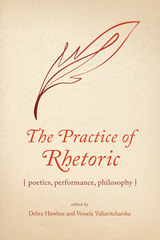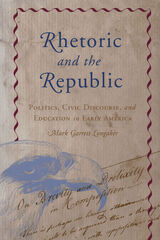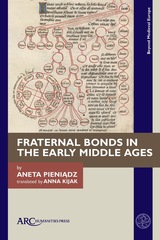2 books about Longaker, Mark Garrett

The Practice of Rhetoric
Poetics, Performance, Philosophy
Edited by Debra Hawhee and Vessela Valiavitcharska
University of Alabama Press, 2022
Essays that show what a broad conception of rhetoric means and does in relation to practice
Rhetoric is the art of emphasis, in the ancient sense of bringing to light or obscuring in shadow, and it is both a practice and a theory about that practice. In recent decades, scholars of rhetoric have turned to approaches that braid together poetics, performance, and philosophy into a “practical art.” The Practice of Rhetoric: Poetics, Performance, Philosophy presents just such an account of rhetoric that presumes and incorporates theoretical approaches, offering a collection of principles assembled in the heat and trials of public practice. The essays gathered in this volume are inspired by the capacious conception of rhetoric put forth by historian of rhetoric Jeffrey Walker, who is perhaps best known for stressing rhetoric’s educational mission and its investments in both theory and practice.
The book extends that vision through the prisms of poetics, performance, and philosophy of argument. Poetics shows rhetoric’s meaning making in all its verbal possibilities and material manifestations, in contexts ranging from mouse-infested medieval fields to the threat of toxin-ridden streams in the twentieth century. Performance puts what is created into the heat of public life, tapping out the rhythms of Byzantine prose or using collage to visually depict the beliefs and convictions of Martin Luther King Jr. Philosophy of argument enacts the mutually constitutive relationship between rhetoric and dialectic, offering new insights on and contexts for old tools like stasis and disputation, while keeping the focus on usefulness and teachability.
Ranging across centuries and contexts, the essays collected here demonstrate the continued need to attend carefully to the cooperation of descriptive language and normative reality, conceptual vocabulary and material practice, public speech and moral self-shaping. This volume will rekindle long-standing conversations about the public, world-making practice of rhetoric, thereby enlivening anew its civic mission.
Rhetoric is the art of emphasis, in the ancient sense of bringing to light or obscuring in shadow, and it is both a practice and a theory about that practice. In recent decades, scholars of rhetoric have turned to approaches that braid together poetics, performance, and philosophy into a “practical art.” The Practice of Rhetoric: Poetics, Performance, Philosophy presents just such an account of rhetoric that presumes and incorporates theoretical approaches, offering a collection of principles assembled in the heat and trials of public practice. The essays gathered in this volume are inspired by the capacious conception of rhetoric put forth by historian of rhetoric Jeffrey Walker, who is perhaps best known for stressing rhetoric’s educational mission and its investments in both theory and practice.
The book extends that vision through the prisms of poetics, performance, and philosophy of argument. Poetics shows rhetoric’s meaning making in all its verbal possibilities and material manifestations, in contexts ranging from mouse-infested medieval fields to the threat of toxin-ridden streams in the twentieth century. Performance puts what is created into the heat of public life, tapping out the rhythms of Byzantine prose or using collage to visually depict the beliefs and convictions of Martin Luther King Jr. Philosophy of argument enacts the mutually constitutive relationship between rhetoric and dialectic, offering new insights on and contexts for old tools like stasis and disputation, while keeping the focus on usefulness and teachability.
Ranging across centuries and contexts, the essays collected here demonstrate the continued need to attend carefully to the cooperation of descriptive language and normative reality, conceptual vocabulary and material practice, public speech and moral self-shaping. This volume will rekindle long-standing conversations about the public, world-making practice of rhetoric, thereby enlivening anew its civic mission.
[more]

Rhetoric and the Republic
Politics, Civic Discourse, and Education in Early America
Mark Garrett Longaker
University of Alabama Press, 2007
Casts a revealing light on modern cultural conflicts through the lens of rhetorical education.
Contemporary efforts to revitalize the civic mission of higher education in America have revived an age-old republican tradition of teaching students to be responsible citizens, particularly through the study of rhetoric, composition, and oratory. This book examines the political, cultural, economic, and religious agendas that drove the various—and often conflicting—curricula and contrasting visions of what good citizenship entails. Mark Garrett Longaker argues that higher education more than 200 years ago allowed actors with differing political and economic interests to wrestle over the fate of American citizenship. Then, as today, there was widespread agreement that civic training was essential in higher education, but there were also sharp differences in the various visions of what proper republic citizenship entailed and how to prepare for it.
Longaker studies in detail the specific trends in rhetorical education offered at various early institutions—such as Yale, Columbia, Pennsylvania, and William and Mary—with analyses of student lecture notes, classroom activities, disputation exercises, reading lists, lecture outlines, and literary society records. These documents reveal an extraordinary range of economic and philosophical interests and allegiances—agrarian, commercial, spiritual, communal, and belletristic—specific to each institution. The findings challenge and complicate a widely held belief that early-American civic education occurred in a halcyon era of united democratic republicanism. Recognition that there are multiple ways to practice democratic citizenship and to enact democratic discourse, historically as well as today, best serves the goal of civic education, Longaker argues.
Rhetoric and the Republic illuminates an important historical moment in the history of American education and dramatically highlights rhetorical education as a key site in the construction of democracy.
[more]
READERS
Browse our collection.
PUBLISHERS
See BiblioVault's publisher services.
STUDENT SERVICES
Files for college accessibility offices.
UChicago Accessibility Resources
home | accessibility | search | about | contact us
BiblioVault ® 2001 - 2024
The University of Chicago Press









